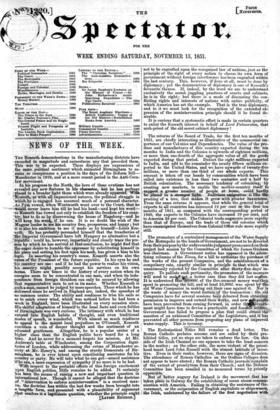NEWS OF THE WEEK.
THE Kossuth demonstrations in the manufacturing districts have exceeded in magnitude and earnestness any that preceded them. This was to be expected. These displays are expressions of the same political sentiment which animated Birmingham to as- . sume so conspicuous a position in the days of the Reform Bill— Manchester in 1819, and at a more recent period in the Anti-Corn- law movement.
In his progress to the North, the hero of these ovations has net revealed any new features in his character, hat he has perhaps laced in a broader light those which were already apparent. With
ossuth, as with all impassioned natures, the political struggle in which he is engaged has assumed much of a personal character. ,..As_Pym vowed, when Wentworth went over to the Court, that he
"-----,recieul never leave him till he had his head—and kept his word-:-- ---so Kossuth has vowed not only to establish the freedom of his coui- 'try but to do so by discrownuig the house of Hapsburg—and he will keep his word, if he can. It is no doubt the wish of the Magyar leader to see his country free, prosperous, and happy ; but it is also his ambition to see it made so by himself—Louis Kos- suth. He has probably persuaded himself that the treacheries of • the Imperial Government have left Hungary no alternative but a republic : could he, however, impartially and clearly trace the pro- cess by which he has arrived at that conclusion, he might find that :the eager desire to humble the oppressor by substituting himself in -his place and setting his foot upon his neck, has given a bias to his :logic. In asserting his country's cause, Kossuth asserts also the -cause of the President of the future republic. In his eyes he and
his country are one : and if he had the power to realize his vision, his country might possibly accept his services on his own -.terms. There are times in the history of every nation when its -energies seem to be concentrated in one man, and when its inde- pendence from foreign thraldoni can only be secured by allowing :that representative man to act in its name. Whether Kossuth is such a man, cannot be judged by mere speeches. Those which he has :delivered since he arrived in England are, indeed, the speeches of 'no common orator. The ability and readiness to trim his sails so as to catch every wind, which was noticed before he had been a `Week in England, hive been illustrated on every occasion since. His skilful adaptation of himself to the local facts and even foibles of Birmingham was very curious. The intimacy with which he has 'entered into English habits of thought, and even traditional ,modes of speech, is wonderful. With almost as much readiness to appeal to the merest local prejudices as O'Connell, Kossuth , combines a vein of deeper thought and the sentiment of an
• educated gentleman. Altogether, he is a popular orator of a I `higher class than the English public have popular for a long time. And he never for a moment forgets his mission. At Mr. Andrews's table at Winchester, among the Corporation digni- taries of London, while addresssing the creme of Manchester so- ciety at Mr. Henry's, and among the sturdy Democrats of Bir- mingham, he is ever intent upon conciliating assistance for his -country or party. He will take what he can get—armed assistance , Ithe can, a mere expression of sympathy if no more is to be had. ! With respect to the probable effects of this foreign excitement upon English politics, little remains to be added. It certainly has been the means of raising a new and important question in international law. Though it cannot be alleged that the doctrine of " intervention to enforce nonintervention" is a received max- im, 'the doctrine has within the last few weeks been brought into at-tangible form, and presented with a plausibility of argument that renders it a legitimate question, whether the principle ought not to be engrafted upon the recognized law of nations, just as the principle of the right of every nation to choose, its own form of government. without foreign interference has been engrafted within the last century. This, however, if done at all, must be done by diplomacy ;, yet the denunciation of diplomacy is one of Kossuth's favourite themes. If, indeed, by the word we are to understand exclusively the secret juggling practices of courts- and cabinets, -he is-in- the right ; but there is a mode of discussing the con- flicting rights and interests of nations with entire publicity, of which America has set the example. That is the true diplomacy, and to it we must look for the recognition of the extended ex- pression of the nonintervention principle should it be found de- sirable.
It is curious that a systematic effort is made in certain quarters i
to enlist the Kossuth interest in behalf of Lord Palmerston, that arch-priest of the old secret cabinet diplomacy !


























